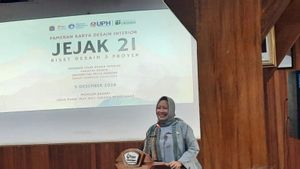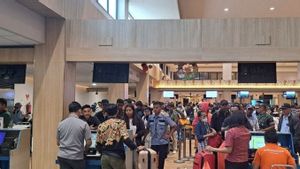Digital Economy Observer Heru Sutadi said the digital economy has a great opportunity to become the backbone of the Indonesian economy in the future. Especially because the digital economy is very inclusive and can be applied to various sectors.
"The principle of the digital economy is how to build an inclusive populist economy," said Heru, Thursday, November 24.
Currently 40 percent of ASEAN's digital economy market share is in Indonesia. The transaction value of Indonesia's digital economy is predicted to be able to reach 130 billion US dollars by 2025, and will continue to rise to 360 billion US dollars by 2030.
Therefore, Heru said, it is very possible that in the future the digital economy will become the backbone of the Indonesian economy.
"It can be because there are indeed many productions and it is estimated that Indonesia will become the largest digital economy. Not only in Southeast Asia and large in Asia. It even hopes that Indonesia can become a digital hub in the world," said Heru.
Furthermore, Heru said at the G20 forum the government conveyed to the world that digital transformation is necessary and must come true. Currently, Heru continued, the sectors that are still growing in the digital economy are e-commerce, finance, health and education.
For example, continued Heru, the extraordinary growth of e-commerce is less beneficial for the economy if Indonesia is only its market.
"E-commerce develops if its products are made or produced from within the country. If we only import for e-commerce products, we will only become a market, and even then if we get a share, it's not big," said Heru.
Therefore, he said, with the huge potential and availability of resources in Indonesia, it must be considered, what digital economy is developed, whether this is a supporting factor or a part of the digital economy itself.
Previously, Coordinating Minister for Economic Affairs Airlangga Hartarto revealed that 40 percent of ASEAN's digital economy market share is in Indonesia. The transaction value of Indonesia's digital economy is predicted to be able to reach 130 billion US dollars by 2025, and will continue to increase to 360 billion US dollars in 2030.
"We must support this potential by strengthening a number of fundamental aspects such as Infrastructure, digital human resources, as well as adaptive, agile, and forward looking policies. We must also accelerate infrastructure development in the Backbone Layer (Pala Ring Network); Middle-mile Layers (Satria Satellite and Low Earth Orbit Satellite), and Last-mile Layers (Base Transceiver Station/BTS) and increase utilization," said Coordinating Minister Airlangga.
Meanwhile, Director of the Institute for Development of Economics and Finance (Indef) Tauhid Ahmad revealed that the potential of the digital economy must be followed up with a number of things so that Indonesia will not only be a spectator of the rapid development of the domestic digital economy.
"Simply put, the economic value is high but the benefits are not us," said Tauhid.
Tauhid said, what should be done is to move digital economic data centers into the country. This means that most digital economic data centers that use applications from abroad and are currently not in Indonesia, must be moved domestically.
"The first is of course the data center. Most of the data centers are still outside. It must be domestically. Not in investor countries," explained Tauhid.
Second, technology transfer in the field of the digital economy must also be carried out. This concerns improving the quality and capacity of human resources (HR) to be able to work in the digital economy.
"Alih teknologi harus dilakukan. Apakah dengan menyiapkan SDM kemudian kemampuan atau kapasitas untuk menabsorb dan sebagainya. Ini kan yang paling besar misalnya e-commerce, travel online, kalau gim dan sebagainya lebih kecil ya," tuturnya.
In addition, strengthening local products must also be boosted in order to compete with foreign digital products.
"Third, strengthening local products. Because some imports are still high. Locally we are not able to compete. For example, electronics, licenses, games, videos, and so on," he said.
Furthermore, the government must also provide regulatory tools that support the development of the digital economy ecosystem. The government must also provide infrastructure that is able to reach all corners of Indonesia.
"Regulation support. If the digital economy is related to, for example, personal data, payment systems, and so on. So that this can reach all regions, the important thing is digital infrastructure. We still have a high gap," he concluded.
The English, Chinese, Japanese, Arabic, and French versions are automatically generated by the AI. So there may still be inaccuracies in translating, please always see Indonesian as our main language. (system supported by DigitalSiber.id)










